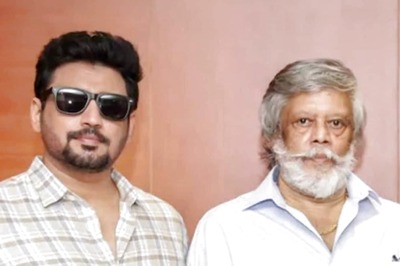
views
New Delhi: The digital water era in India has officially begun. Government officials, technology and water experts on Thursday gathered in Delhi to discuss the potential of artificial intelligence, virtual and augmented reality (AR), information and communication technology (ICT) in the way water is used, managed and conserved.
The ICDL 2019 conference, organised by The Energy and Resources Institute (TERI), brought together the who’s who of the water sector under one roof to set the agenda of digital water, “not as option, but as an imperative” in the country.
“We are a water scarce country. Per capita water is going down drastically. One of the reasons of its making is technology – that could not play its role,” said Bharat Lal, additional secretary (water), department of drinking water and sanitation at the Jal Shakti ministry.
Lal, who was delivering the inaugural address at the conference, stressed on the need to “correct our fundamentals” in the way we have used and viewed water as a resource. “Every family must have clean water. We must not play with words by saying ‘access to’ etc. That era has ended. The era of half-truths has ended,” he added.
“The common man must not struggle for a common resource.”
Depleting ground water levels, low and erratic rainfall and water scarcity hit a new high this year with the NITI Aayog declaring that 21 cities are likely to face severe water scarcity by 2020. Along with Mumbai, Bengaluru and Hyderabad, water also ran out in the city of Chennai earlier in June after a deficient Northeast Monsoon in 2018.
Restaurants, schools and offices shut in the southern city as the water crisis intensified with the waiting period for water tankers increasing to a 25-day high. Towns and villages across rural India perhaps faced the worst crisis.
Being at the forefront of this national crisis, the senior government official reiterated the need to move out of the “incremental approach to services.”
Here, embracing digital solutions for this crisis paves the way towards a “sustainable and secure water future” by moving to the “next generation of water systems”, read the primer by TERI.
Dr S Mohan, professor at IIT Madras and chair of International Water Association (India), noted that the next-gen water systems can be developed only by “filling the data gap” in what he considers an important value chain: “data, information, knowledge and action”.
He said India must move ahead abiding by three principles: smart by design, smart use and smart control. “We are moving towards smart cities, but there is no smartness without smart water.”
Water-wise Cities
Although some state governments and municipal bodies across the country have joined hands with tech companies to deliver to smart water treatment facilities and drainage systems, Dr AK Gosain, professor of civil engineering at IIT Delhi, believes more needs to be done about river basins.
He emphasised on the need to effectively implement Integrated Water Resources Management (IWRM) with the basins as the basic unit. In addition, the use of smart sensors to enhance early warning systems for flash floods, and sensing system and data at rivers and canals to profile water flow and quality is also recommended.
However, until then, the government’s goal to provide tap water in every household, may appear “unsure,” Gosain clarified.
“I am scared; how will we provide tap water to every household. It can only be done with the proper digitisation of the basins. This has to be done at the district level because streams losing water to ground water (aquifers) is unnatural,” he said.
But, the problem is much graver than what appears to the eye. Despite vanishing surface water bodies in the city, ground water level in Delhi is depleting at an astonishing rate of 10 cm per year, a study by the National Geophysical Research Institute (NGRI) has found.
As a solution, the IIT professor, who is instrumental to the conception and planning of the Delhi Drainage Master Plan and the Ganga River Basin Master Plan, suggested making “districts accountable for water flow” under a set “yardstick”.
“Existing water systems only transfer water. They do not ‘create water’. We need digitalisation to know about water – where it should be, and where it is,” he said.
For the urban landscape, Anshuman, associate director at the water resources division in TERI, echoed a similar response, but added that metering at the consumer level could potentially be the first step into updating existing water systems.
“Metering is an important component. Real time monitoring is the need of the hour. Leakages have to be avoided,” he said, underlining on the need to bring ICT based solutions to water crisis.
“Water should not be free of cost,” he added, seeking accountability for its use.
The TERI official stated three important stages of water management that ICT helps tighten: “accessing information real time, real time analysis and right stakeholder dissemination of water.”
At the conference, there were also water-based tech companies like Manoj Kumar of Smart Energy Water who stressed on “customer engagement” using apps and platforms to “report water leakage and incentivise its reporting” and Rakesh Pandey of GenX Info Technologies who elaborated on the need for automated water management systems at the municipality and dam level.
Besides, industry leaders in automation and electricals Siemens and Larsen and Toubro were also present at the discussion, highlighting their contribution in reducing water losses using technologically advanced hardware.
















Comments
0 comment